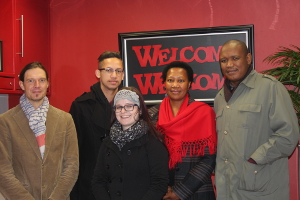Latest News Archive
Please select Category, Year, and then Month to display items
12 January 2024
|
Story Nonsindiswe Qwabe
|
Photo Sonia Small
 Since joining the UFS in 2008, Dr Grey Magaiza has worked extensively on approaches that can foster the socio-economic transformation of societies.
Since joining the UFS in 2008, Dr Grey Magaiza has worked extensively on approaches that can foster the socio-economic transformation of societies.
“The future should be one where communities can decide on their development agenda and futures. That’s the most important for me.” Dr Grey Magaiza, Deputy Director of the Centre for Gender and Africa Studies (CGAS) and Head of the Community Development programme on the Qwaqwa Campus, is passionate about capacitating communities to be agents of change and advancement. His vision for the future emphasises the empowerment of communities to take charge of their development by actively participating in decision making and the implementation of development projects that can improve their lives.
Since joining the UFS in 2008, Dr Magaiza has worked extensively on approaches that can foster the socio-economic transformation of societies. Over the years, he has crafted his research speciality into one that he is most proud of – being an interdisciplinary scientist immersed in the development of communities.
“I’m in a fortunate position of researching what I like. I say ‘fortunate’, because I’ve taken the time to understand what I’m passionate about, which is the overall field of rural livelihoods and livelihood futures – in short, community development. My research starts from an engaged university, understanding the elements that a university must use to enhance transformation and relevance to its immediate community in terms of development.”
One of the ways he has done this is by looking at social entrepreneurship as a development approach for young people in a rural setting. Through workshops with non-profit and civic organisations in Qwaqwa, Dr Magaiza has been helping these organisations to map out their needs and actively meet them through the involvement and support of external role players.
“We understand that communities are part of the national development agenda, but even that national agenda respects community knowledge and intentions and allows communities to shape their identity. A critical enabler of this is community organising. You bring back the capacity in communities to have dialogues on issues affecting them as spaces for engagement, knowledge exchange, and for people to just talk about their way forward.”
By enabling communities to define their development agenda, they can address their specific needs, challenges, and aspirations, he said. “When I look at livelihood futures, it’s quite an exciting aspect of my work – it’s like looking into a fortune tellers’ globe, because you’re not deciding for communities what they should do, but the communities themselves take those decisions.”
2015 Erasmus Mundus Grantees announced
2015-07-07

Front row, from the left: Frans Kruger, Lecturer: School of Education Studies; Trudie Strauss, Lecturer, Mathematical Statistics and Actuarial Science
Back row, from the left: Johnathan Adams, Teaching Assistant: Centre for Teaching and Learning; Moliehi Rosemary Mpeli, Lecturer: School of Nursing; Ncedo Xhala, Research Assistant: Quantity Surveying and Construction Management.
Photo: Mamosa Makaya |
The grantees of the 2015 Erasmus Mundus programme have been announced, and will soon head off to various institutions at European universities to embark on academic and professional exchange programmes. The cohort is made up of some of the best, most talented staff of the university, who are currently studying towards master’s and PhD programmes in fields such as Mathematics and Actuarial Sciences, Quantity Surveying, Bioethics, and Education.
The Erasmus Mundus programme is an international partnership that enhances academic cooperation between institutions of higher education in South Africa and the European Union, and has within it the EUROSA, EU Saturn and INSPIRE programmes. It aims to promote inter-cultural understanding, and the development of both European and Third-Country universities. The UFS has participated in the programme since 2010. In 2014, 13 staff members were granted PhD and master’s study programmes for a period of up to 22 months in various fields such as Communication Science, Urban and Regional Planning and Law, at among others, the Universities of Ghent, Antwerp Tilburg and Uppsala.